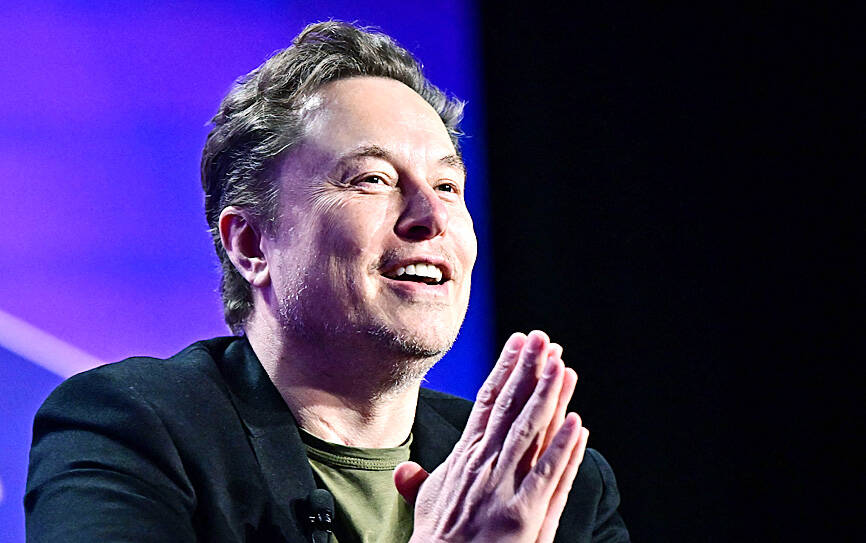Social media platform X is to shutter its local operations in Brazil following a bitter legal tussle over the platform’s rights and responsibilities, owner Elon Musk said on Saturday.
The service is to remain available to Brazilian users. The closure was the apparent culmination of an ongoing legal battle between Musk and Brazilian Supreme Court Judge Alexandre de Moraes, who has said he is trying to fight the spread of dangerous disinformation online.
Moraes had “threatened our legal representative in Brazil with arrest if we do not comply with his censorship orders,” a post from X’s Global Government Affairs Department said on Saturday.

Photo: AFP
It said the office closure was necessary “to protect the safety of our staff.”
“The responsibility lies solely with Alexandre de Moraes,” it added.
The Brazilian government was critical of X’s stance, with Brazilian Secretary of Digital Policies Joao Brant writing on the platform that the company had a “pathetic attitude.”
X would force a “probable escalation that could lead to blocking of the platform,” he added.
Moraes previously had ordered the suspension of several Twitter accounts suspected of spreading disinformation, including those of supporters of former far-right Brazilian president Jair Bolsonaro, who tried to discredit the voting system in the 2022 presidential election, which he lost.
“Freedom of expression doesn’t mean freedom of aggression,” Moraes has said. “It doesn’t mean the freedom to defend tyranny.”
Musk and other critics have said Moraes is part of a sweeping crackdown on free speech.
Musk said that had X complied with Moraes’s orders, “there was no way we could explain our actions without being ashamed.”
In April, Moraes ordered an investigation of Musk.
An order seen by AFP showed Moraes accusing Musk of “criminal instrumentalization” of the platform.
Musk had reactivated banned accounts, and Moraes said he threatened the billionaire with a fine of about US$20,000 for each instance.
“Social networks are not lands without laws,” Moraes wrote.
Musk responded that while X might lose its Brazilian revenue, “principles matter more than profit.”

ADVERSARIES: The new list includes 11 entities in China and one in Taiwan, which is a local branch of Chinese cloud computing firm Inspur Group The US added dozens of entities to a trade blacklist on Tuesday, the US Department of Commerce said, in part to disrupt Beijing’s artificial intelligence (AI) and advanced computing capabilities. The action affects 80 entities from countries including China, the United Arab Emirates and Iran, with the commerce department citing their “activities contrary to US national security and foreign policy.” Those added to the “entity list” are restricted from obtaining US items and technologies without government authorization. “We will not allow adversaries to exploit American technology to bolster their own militaries and threaten American lives,” US Secretary of Commerce Howard Lutnick said. The entities

‘SWASTICAR’: Tesla CEO Elon Musk’s close association with Donald Trump has prompted opponents to brand him a ‘Nazi’ and resulted in a dramatic drop in sales Demonstrators descended on Tesla Inc dealerships across the US, and in Europe and Canada on Saturday to protest company chief Elon Musk, who has amassed extraordinary power as a top adviser to US President Donald Trump. Waving signs with messages such as “Musk is stealing our money” and “Reclaim our country,” the protests largely took place peacefully following fiery episodes of vandalism on Tesla vehicles, dealerships and other facilities in recent weeks that US officials have denounced as terrorism. Hundreds rallied on Saturday outside the Tesla dealership in Manhattan. Some blasted Musk, the world’s richest man, while others demanded the shuttering of his

Minister of Finance Chuang Tsui-yun (莊翠雲) yesterday told lawmakers that she “would not speculate,” but a “response plan” has been prepared in case Taiwan is targeted by US President Donald Trump’s reciprocal tariffs, which are to be announced on Wednesday next week. The Trump administration, including US Secretary of the Treasury Scott Bessent, has said that much of the proposed reciprocal tariffs would focus on the 15 countries that have the highest trade surpluses with the US. Bessent has referred to those countries as the “dirty 15,” but has not named them. Last year, Taiwan’s US$73.9 billion trade surplus with the US

Prices of gasoline and diesel products at domestic gas stations are to fall NT$0.2 and NT$0.1 per liter respectively this week, even though international crude oil prices rose last week, CPC Corp, Taiwan (台灣中油) and Formosa Petrochemical Corp (台塑石化) said yesterday. International crude oil prices continued rising last week, as the US Energy Information Administration reported a larger-than-expected drop in US commercial crude oil inventories, CPC said in a statement. Based on the company’s floating oil price formula, the cost of crude oil rose 2.38 percent last week from a week earlier, it said. News that US President Donald Trump plans a “secondary